I gave up saying ‘actually’ five years ago. Everyday it is struggle to break this addiction, but so far so good. I am clean of actually. But it is a day-by-day struggle. Actually is always there, waiting for a moment of weakness. It is always tempting the unwary. However if a nerd like me can do it, so can the reader!

Spare a thought for that overworked word ‘actually.’ This adverb has become a menace.
‘Adverb?’ Yes, it is an adverb which modifies just about anything that comes along, an adjective, another adverb, or a verb.
To illustrate, the word ‘actually’ can modify an adjective in this this phrase ‘the house is actually brown.’ Got it? It is a brown house. ‘Actually’ can modify another adverb as in this phrase ‘the house is actually very brown.’ The house is not just brown but very (‘very’ is also an adverb) brown, actually. It can also modify a noun, to wit, ‘this is actually a house.’ Not just a brown house, but actually a brown house (pedantic note: with the indefinite article the noun ‘house’ becomes — voilà! — a noun phrase). In these correct uses it adds….little, if anything, to the sense of the phrase.
Whew! Those are the legitimate uses of ‘actually.’ Now bear those in mind for one day, and listen to the occasions when it is used. Makes a spreadsheet and see what the results are.
Cannot be bothered to do it? Well, I have, and here is what I have found.
It is used repeatedly, sometimes three or more times in a sentence for emphasis, not to convey information about the degree of brown of a house. The word ‘actually’ actually adds very little to these phrases, actually. Instead the proliferation of actuallys serves other purposes.
The sanctimonious newsreaders on the ABC use it to editorialise by implication on the news, as ‘in the Government has actually taken steps’ on this or that. Surprise! Surprise! Those lazy toads in Canberra have finally done something is the ever-so subtle subtext. Such public displays of addiction can only corrupt the youth.
Comperes of televised quiz shows perform triple actuallys by using it three times in one sentence. Not a single use conveys any information, nor does three. This is more public degeneration of language and by someone who knows all the answers.
Youths overheard on the street outdo that lamentable standard by inserting ‘actually’ every three words. These are the real addicts. No phrase of more than three words can be said without this crutch. These are the victims of the plague of actuallys. No remarks sounds right to these actually-junkies without a sprinkling of superfluous actuallys. That is how actually-addled they are.
What is worse, this plague passes unnoticed. There is no government action. The media, captive to the vested interests, has only blind eyes to turn to this catastrophe. Where are the talking heads when we need them?
The fight has to be at the grassroots. Swear off actually now! Form actually-denier self-help groups. Pedants unite!
Author: Michael W Jackson
‘The Time Regulation Institute’ (1962) by Ahmet Tanpinar
Tanpinar (1901-1962) is one of the deans of Turkish literature, according to Orhan Pamuk, he of the Nobel Prize for literature. The master narrative of Tanpinar’s novels is its identity. Is Turkey Asian and Islamic or European and secular if not Christian. Is Turkey a traditional society rooted to and limited to the past or modern society making and re-making itself.
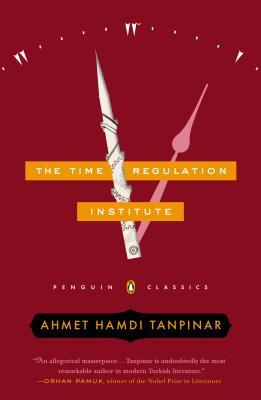
These themes are embodied in the satire in the creation and evolution of the Time Regulation Institute, a private corporation which, for a fee, will adjust clocks and watches to the right time in kiosks around the country. As life becomes more regulated, the demand for this service grows. No longer do sunrise, high noon, or sunset mark the days but rather hours and minutes.
The corporation is paternalistic, nepotistic, sexist, incompetent, and succeeds despite itself. It becomes home to a psychoanalyst who wishes to study its members, an alchemist who wants to use the clockwork mechanism for some purpose or other but he is secretive about it, wives, nephews, cousins, European trained scientists who cannot get any other work in a society where suspicion of foreign taint is routine, concubines, and wastrels. Its counter staff are all attractive young men and women in smart uniforms and they rake in the dosh.
After four hundred pages all this is laboured. The novel unfolds as a memoir by Hayri Irdal, the Institute’s first employee. There is much background of the various, idiosyncratic, zany members of his family, and the brooding presence during his formative years of a large long case clock that seems to work when it wanted to and at no other time.
The Institute is so successful that it attracts the interest of the government in search of tax revenue, and other shysters in search of easy opportunities. In the wings we have a double murder and suicide involving Irdal’s relations and friends. None of it taken too seriously.
In a difficult press conference in the early days of the Institute a parable was used to explain its purpose. Ahmet the Timely from centuries ago was quoted and his sagacity struck a nerve in the public. There was a demand to learn more of this sage. Despite qualms, Irdal writes a biography of this completely fabricated character, which is a great success and does much to cement the place of the Institute, despite the quibbles of some pin headed dopes in universities who point out that this man never existed.
The satire is the superficiality of it all, which in fact leads to its success. The fact that Ahmet did not exit frees Irdal from sticking to boring facts. The fact that no one needs to have the time regulated makes it a perfect commodity.
Perhaps to a Turkish reader what is most conspicuous is what is not said. Not a word about women’s head scarfs in the many references to the uniforms. Not a word about the calls to prayers five times a day as regulators of life.
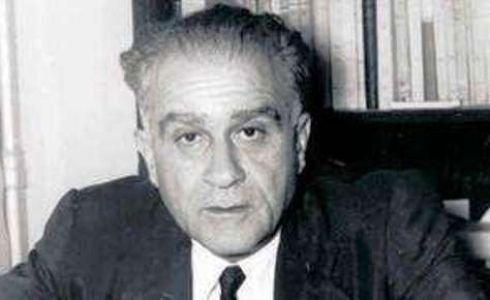 Ahmet Tanpinar
Ahmet Tanpinar
As with Russian novels, I continue to find it hard to distinguish the characters by name, the more so with women whose names are strings of letters. How parochial am I.
‘Perfect Cities: Chicago’s Utopias of 1893’ (1991) by James Gilbert
The book profiles the several Chicagos that co-existed in 1893 when the World’s Columbian Exposition (the official shortened name for the World’s Fair: Columbian Exposition, also known as The Chicago World’s Fair and Chicago Columbian Exposition. Against the odds, Chicago wrested the right to hold the Fair from New York City. The sniping from New York City was without end.
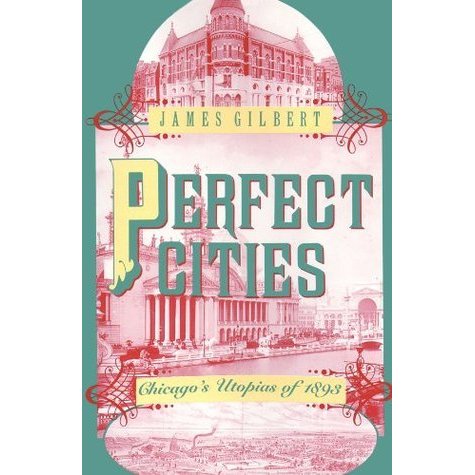
I saw a miniature replica of the White City of the Chicago World’s Fair at the Durham Museum in Omaha a few years ago. I had forgotten that sight until I read this book.
The White City that was the heart of the Exposition. All of its buildings were neoclassical in style, plastered in a shining material, and painted white. In addition, outdoor lighting, including street lighting, was used extensively as electricity was promoted as the future. Some things are not said. The White City was a front in the contest between direct and alternating current electricity which Nicolas Tesla eventually won, though Thomas Alva Edison, who lost, made the money. The White City was not only painted white so as to gleam and glisten in the sunshine, but also to reflect the light of the electric lamps throughout. It was brighter at night than on many a dreary day. Also unsaid is that the White City was the site of the first labeled serial murderer who stalked victims in the nocturnal White City, a fact suppressed at the time in the interest of keeping the 27 million tourists coming. Yes, 27,000,000. The Fair was intended to showcase the arts, industry, and science, but most of all to showcase Chicago as a city of the future. In cooperation with the railroads, the Fair was a tourist attraction that brought tourists from far and wide, e.g, 25,000 from Connecticut alone.
By the way the construction was largely intended to be temporary. In any event nearly all of it burned down in two fires in 1894 and 1895. One building made to last remains and that is the Field Museum endowed by Marshall Field of the department store that has been subsumed by that orca of department stores, Macy’s, once confined to Fifth Avenue, it now roams the retail waters everywhere.
To make travelling easy, many guidebooks were published and distributed widely, sometimes freely. The author’s analysis of what these guidebooks include and do not include is clever, creative, and informative. Like the Fair itself, they emphasise the future and disregard the past, in their case the real city of Chicago with tenements, union unrest, child labor, alcoholism, and disease, still less the stockyards, of which nothing was said. We have also noticed how contemporary guidebooks handle the darker side of things, and the differences among guidebooks when we have consulted more than one.
By the way the World’s Fair was called that because one of its founding and long term sponsors was the newspaper the ‘New York World’, which also sponsored later the baseball World Series, and hence the origins of that name, too, neither being the example of parochial American imperialism that pin heads often assume.
One of the cities is Pullman Village, built by the railroad entrepreneur George Pullman whose business model was to sell comfort and luxury, and micromanage to achieve it. His underlying thesis was that salubrious surroundings would bring out the best in people, a common belief in the Victorian Era. If we want to stop men spitting, then lay down carpets and they will not spit. All of this was designed to encourage women to travel, too, and ergo to encourage families to travel together. That was also part of his thinking, men travelling with families would act better than men travelling among only other men. The locker room versus the tea party, that might be the comparison. (That was the reasoning when dormitories on college campuses went co-ed. It would lead to improved behaviour among the lads. Wonder if anyone has collected evidence on that one?)
His business model was this: he leased his sleeper, lounge, kitchen, and dining cars to railroads; he did not sell them. With these cars went Pullman’s staff: porters, chefs, waiters, conductors, who were trained in his approach to courtesy and service. No matter which railroad, a Pullman car offered the same service, accommodation, food, and so on.
He also thought he could shape his workforce just as he hoped to shape his clientele, so he built the Pullman Village around the factory where the railway cars were built, and offered a very good standard of housing, shopping, access to fresh food, schools, theatre, exercises for the family together and so on. Nothing is said, but I assume it was racially segregated. Indeed virtually nothing is said about race.
By the way Pullman was inspired to build this village by a visit to Saltaire in Leeds. Titus Salt was in turn inspired by William Morris and Robert Owen, important figures in the utopia tradition.
Paternalist that he was, Pullman could not abide growing unionism in railroads, sometimes led by Eugene Debs, and his intransigence precipitated that infamous Pullman Strike in 1894 that led to the ruin of his company. In sum, times turned down, Pullman cut wages by a third but would not reduce the rent he collected from workers in the Village. Of course others lost their jobs and with the loss of the job they also lost the housing in the Village. He would not compromise one inch and even the local newspapers owned by his peers and friends turned against him. Nonetheless, the incompetent Grover Cleveland turned the army loose. Douglas MacArthur was there, practising for his later efforts at Hooverville.
Another of the cities is Harvey Illinois which was also a planned workers’ community inspired by the evangelist Dwight Moody. Moody was a major figure in the region, in part, because he was more pragmatic about entertainments like music, singing, and dancing than many of the Elmer Gantry rivals. The robber baron Turlington Harvey built Harvey under his influence. When Harvey lost interest it quickly reverted to the norm.
One of the most interesting but hardest to fathom parts of the book is the account of The Midway which, I think, was the fun fair associated with the Exposition. It offered cultural variety and light entertainments, approved by a board of elders. Perhaps I blinked too many times, but I never did grasp the author’s point in the recurrent references to it.
 James Gilbert of the University of Maryland
James Gilbert of the University of Maryland
The author uses the words ‘utopia’ and ‘utopian’ a number of times without stipulation. The only meaning I can read in his use is planned, on the assumption that a well planned city will continue in the way planned. Of course the White City was also built, perhaps, metaphorically to usher in a spotless future. Pullman and Harvey were built to promote certain kinds of better conduct, and that is part of the promise of utopia, but better is very limited to sobriety, courtesy, work ethic, and so on.
I read it in anticipation of spending a week in Chicago in March 2016.
On the murders see ‘The Devil in the White City’ (2004) by Erik Larson.
Tacitus on the Molonglo.
A few thoughts provoked by reading Lara Tingle’s ‘Political Amnesia: How We Forgot How To Govern’ In ‘Quarterly Essay 60.’
It is one of the few ‘Quarterly Essays’ to have an argument. What is it then?
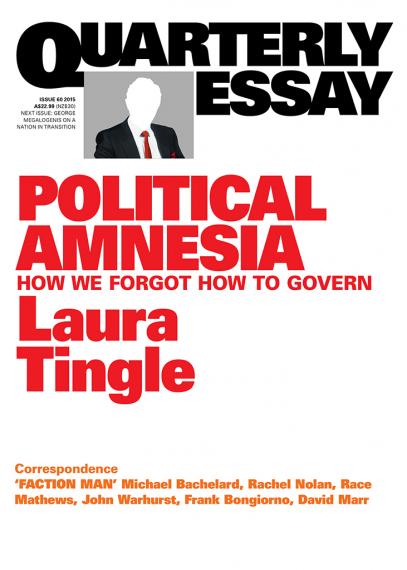
The premise is that corporate memory is a valuable asset in complex organisations to operate in a large and varied environment, and ever changing environment. Government is one such organisation that works better if corporate memory is present. Those seem to be the most relevant assumptions.
The argument then is that corporate memory has been systemically, if inadvertedly, reduced in the Australian Commonwealth Government since the 1980s. The signal indication of this was the shift from tenure to higher pay for the elite of the public service. That was the end of the permanent department head, and by implication the end of any permanence down the ladder in the public service.
Tingle gives several reasons, a compound of these elements:
1. contracting out public services so that the remaining public servants do not have first hand experience at delivery and so do not know the problems and opportunities in the field. It is certainly true that I have spoken to public servants who write contracts for others to bid on to deliver services, and these contract-writers have no firsthand experience in the field. They say they rely on the contractors, because the competitive market will keep them honest. (Did someone say that about the Australian Wheat Board?)
2. the contractors come and go and even those that recur have a staff turnover that limits their memory as well. One of the goals of contracting out is to cut cost, the chief one being something that is never said: superannuation. The unfunded liability of the Commonwealth government for public servants’ superannuation is astronomical and seemed to grow exponentially. Those commitments were reduced for the future, but the historical legacy is still enormous. To avoid a colossal increase the key is to have fewer public servants.
3. public servants find career is best served by avoiding service delivery departments (an old one). Those public servants who remain discovered that expertise (developed in part by trial and error) is no longer valued and so it no longer valuable in career advancement. Service delivery is hard, exhausting, and can go wrong. Drafting policy papers is none of that.
4. career is made by moving from one department to another rather than concentrating on one speciality. Here we have that old chestnut that management/policy/administration is generic, neither carrying nor requiring specific knowledge. Indeed such knowledge is a hinderance.
5. at a second level appointed ministerial staff have replaced public servants in policy and program development and they come with no corporate memory and move on without leaving any behind.
6. ministers move from one portfolio to another, especially when moving from opposition to government. They do not know what they do not know. That is so simple and obvious and yet hard to explain to a third party, let along to a principal.
7. new ministers distrust public servants in the increasing polarised atmosphere of Canberra. I expect this one is crucial. The air of conspiracy and menace in Canberra seems to increase every year. Partly the media appetite for dirt subjects every move to hours of video and talking head scrutiny. Many in opposition set themselves against both the Government of the day and all who assist it, namely, the public servants. The flexibility in employment introduced by Labor when permanent heads of departments were abolished, now makes it easy to deal with those enemies once in office.
8. the repeated purges of the public service have left one memory among public servants, that is to keep heads down. The endless, repeated cuts in the public service have not only lowered the morale of the public service, though no one will admit it, it has also discouraged people from supposing there is a lifetime career there. It is not just movement between departments but also the movement out of the public service that diminishes the talent pool.
9. the blind faith that the market will generate a response, e.g., a sufficient number of skilled and qualified tradesmen to install insulation in the political time line. This is an ancillary point.
Overall the essay sounds curmudgeonly and I like that but…. Remembering that ‘we tried it before and it did not work,’ well, yes, and I have said that myself more than once in my little patch, but it is also true that times change and perhaps the time is now right. I saw ideas fail, and then arise again and work. It does happen.
To this reader the stronger ground for the argument is that memory of how to work the process, negotiate with the cross bench, involve parliamentary committees, respect parliamentary draftsman…. When this memory is lost mistakes will be made and repeated, forgotten and repeated again.
My caveat to the argument is this: The waves of retrenchments, downsizing, has not just shed people, it has also shed expertise (as distinct) from memory which has not been replaced like parliamentary draftsmen.
The short cycle of elections has always been with us, and the media has always been rapacious.
Tingle also makes a good point about the transition from opposition to government that I would give more emphasis. A leader of opposition works very closely with a very small staff due to funding, office space, convenience, and so on. There is something of a bunker mentality in most opposition leader’s offices: us versus them. The Opposition leader alone challenges the sitting government. The media certainly play it that way. Add to that a long tenure as opposition leader and these tendencies deepen.
In a polarised atmosphere my enemy’s friend is my enemy. Public servants who work hard and closely with the government of the day can become, to an opposition leader, such enemies-by-association. Hence the now recurrent purges of public servants when government change.
The silent assumption is that there are plenty of hard working, bright, and talented people to take over. There are always plenty of people who think they fit that description. Or is the assumption that talent does not matter. By ‘talent’ I wrap together memory and expertise to keep the terminology simple.
For shadow ministers in opposition who have never been a minister, parliament might be something like theatre. Huh?
They see many plays, each and everyday, but they have never been behind the scenery and have never seen any of the stage machinery and stage management that puts on the show, have not talked to the carpenters who built the scenery or electricians who handle the lights. Theatre critics concentrate on the result without a thought to the production. Fine for them as critics who do not aspire to be producers. But shadow ministers who criticise ministers aspire to be ministers.
There is a learning curve in the transition from opposition front bench to minister that is seldom recognised by new ministers who carry attitudes, habits, expectations, ambitions formed in opposition to government. The gap between opposition and government is also abridged by journalists who refer to shadow ministers as ministers. Grrr, ABC journalists do this, I am told, partly to inflate the importance of an interview in the minds of viewers and to flatter the interviewee. There are so many excuses for stupidity.
The most troublesome part of the luggage a new minister carries is the conviction that for a minister to say it is so makes is so. All it takes is will power! The details, leave those to others, and focus on the big picture!
Pile those clichés high!
The devil hides in the detail. Those looking up at the big picture often step in potholes.
There is no right way to do the job, but mixed scanning, near and far, is the best way to learn. But of course one has to want to learn or to know that there is something to learn. Some in opposition do study the process, monitor committees, read interim reports, talk to public servants, make constructive criticisms and these few are more likely to make an easier transition to minister. But often such an approach is criticised by colleagues because it is not aggressive enough, not machismo enough. Who needs details when bluster is the coin of the realm.
Having said all that, I am not sure returning to the era of the Seven Dwarfs, i.e., permanent heads of departments would offer a net gain. Or would it be to trade one set of problems for another.
 Lara Tingle
Lara Tingle
Still any lengthy essay on contemporary politics that starts with rumination about Tacitus is must reading for nerds.
Rudolf and the Occult Arts
Emperor Rudi the Two was a retiring and secretive man by nature and nurture. Perhaps that made the lure of the Occult sciences all at the more congenial to him. While he would seldom leave the keep of his castle in Prague on Hrady hill, he would welcome anyone who claimed to have a secret to tell. Not gossip about people, but rather secrets about how the world works and the meaning beneath appearances.
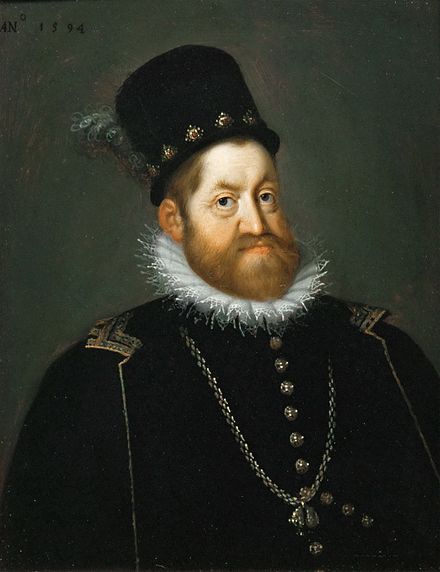
The Occult claimed to penetrate beyond the world of appearance and experience to the hidden reality that underlay it. Clues to this reality appeared to the cognoscenti in symbols and emblems from crosses to hexagons. An inspired artist was as likely as a scientist to chance upon these keys to the mysteries of the universe.
Alchemy was the most self-conscious of such sciences but not the only one. It was different from the later stereotype of a crazed individual throwing this and that together to see what happens, for alchemists in Sixteenth Century middle Europe comprised a disciplined school that followed certain principles. Rudi had as many as two hundred alchemist in his employ, with his own private laboratory where he did his own experiments.
The alchemists sought to control reality, not to understand it. Natural philosophers of the day sought knowledge, but the alchemists sought power.
The Occult belief in the reality of unseen things aligned them with much the religious mysticism of the era as did their denial of Enlightenment rationality. Most of their number ignored both Catholicism and Protestantism in preference to sui generis sects of neo-Platonism and such ilk. Secret rituals, incantations, E = MC squared, they were all on the same plane in the cosmology.
Rudi paid a high price for hermetic books that would open a door to the beyond. Many were written and published with his financial support. Many of the books ostensibly revealed the code, but were themselves coded. Some of them were so heavily encoded that no one could understand them. Indeed sometimes the more incomprehensible a text was, the higher the price it commanded. What a field for a charlatan. Or even a professor!
In a few years some of this would be codified under the Rose Cross of the Rosicrucians. Esoteric knowledge went on the curriculum.
All manner of Occultists went to Prague to take some of the Emperor’s gold while promising to replace it by creating gold from lead. Whether sincere or fraudulent, none delivered on the otherworldly promises.

In the same vein, the Occultist believed that some objects were transmitters or receivers of the hidden reality, usually gems of great beauty or perfection. Or unusual natural formations. Rudi was a one-man market for these things, and sometimes engaged in a bidding war with others to acquire them. Other bidders wanted them for their beauty and uniqueness, Rudi wanted to tune them into an Occult broadcast.
He funded the construction of many clockwork automata, partly because, like a Shinto follower in Japan, his spiritism meant even inanimate objects could channel the Occult. Many rooms in his ever growing palace complex housed these toys some life size and even lifelike. Imagine a stormy night in one of these warehouse of automatons with shutters banging, and floors creaking, glassy eyes staring. Spooky.
One of the many tenets of the Occult is that some geniuses are touchstones — like a medium at a séance — who hear, understand, or transmit (to a small and select audience) the secrets they receive. This knowledge is so fantastic, so powerful, so awe-inspiring most of us cannot fathom it. Indeed most of us would not recognise these profundities even if face-to-face with them, but if we did, then we would misuse it. It is best hidden from the ordinary people like thee and me. They are secrets in plain sight.
The steam from this kettle leads to the supposition that some geniuses leave coded messages in their works, poems, books, painting, statues. Often the code is numeric, especially in books. Think of Johnny Depp in ‘The Ninth Book’ or Dan Brown’s various larks. Accordingly, it is said that a genius like Plato hid his message in the seventh word in seventh line on seventh page of his seventh book. The Occultists then strive to determine which is the seventh book, which is the seventh page, which the seventh line, and the seventh word. The example, if crude, is nonetheless indicative of how such minds work.
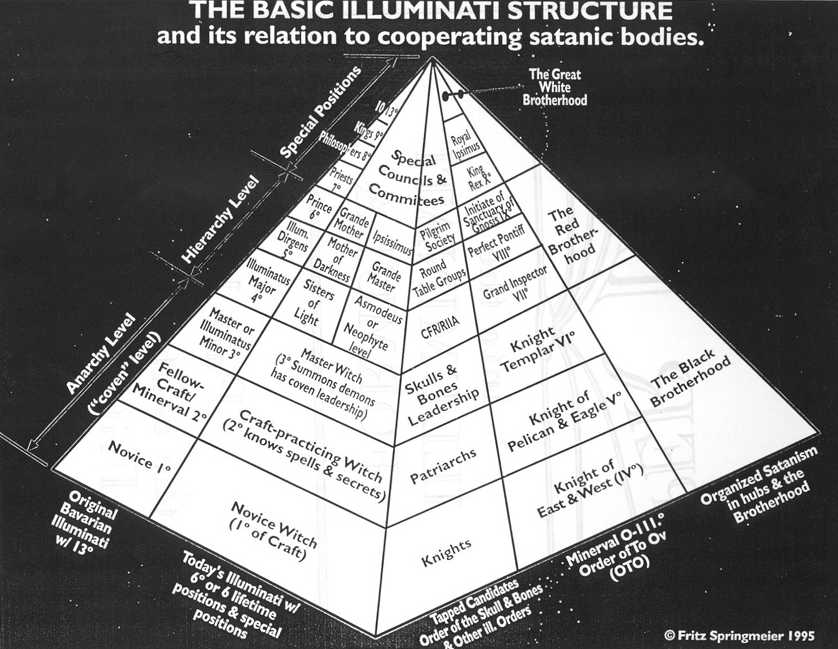
Plato’s text contains a coded message, perhaps several, and we have to find the key. To find the key, we disregard what Plato said explicitly and look instead at the incidental remarks, fillers, repetitions, seeming errors, non-sequiturs, apparent discontinuities – these offer the clues about whether it is the seven word or the ninth. The least important parts of a Platonic text may be in fact the most important.
Thus do some political theorists discount most of Plato’s explicit arguments and turn them upside down and inside out to arrive at conclusions that they alone can see. The example that comes to my mind is Plato’s repeated assertion that women equal men. Plato says this is different ways in three of his major works. A dedicated follower of the esoteric school of interpretation will conclude that the more Plato says it, the less he meant the knowing reader to take it at face value.
One can never win an argument with such an interpreter. And believe me, such interpreters exist.
To get back to Sixteenth Century Prague, Rudi also sponsored all manner of seminars which took the form of séances in many dark rooms in his palace. He did not often sit in himself, but he wanted to know what happened, and was inclined to be credulous. Though in his ecumenical way many of those he kept around him in court were skeptical and he permitted them to express their doubts.
By the way, when Rudi moved the capital out of Vienna it was not obvious that Prague was the best choice. There were plenty of other cities from which to choose in northern Italy, along the Danube, or in southern Germany. He chose Prague perhaps because it had a reputation as a religiously free(r) city than any other. It was not dominated by either an entrenched Catholic or Protestant establishment. These two had battled it out a hundred years earlier in Prague, murdering each other with great energy, and fell into an exhausted and dispirited peace where they (barely) tolerated each other. That would have suited Rudi who had no interested in religion beyond the most minimum formalities. A move to some other city might be seen as supporting the religion dominate in that place.
‘Rudolf II and his world: A Study in Intellectual History, 1576-1612’ (1997) by R. J. W. Evans
Who was Rudi 2 and who cares? Rudolf was King of Bohemia, King of Hungary, and King of a few other places, too, He was a Hapsburg whose accession to the Imperator was vexed, but in the end went smoothly. The fiction was that electors (members) of the Holy Roman Empire chose the the emperor. By the time Rudi came along it was a long title with little substance and meaning.
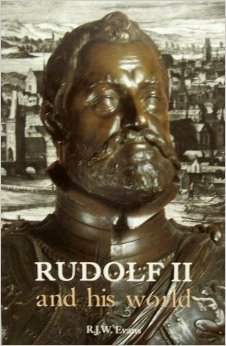
The Holy Roman Empire, for those who slept through ‘The History of Western Civilisation’ when it was still possible to teach under that title goes like this: A Pope crowned Charlemagne Emperor in 800 A.D. to defend the faith. Big Chuck passed the sword on to his sons who split up his Empire and in 1100 A.D. one of his distant successors revived the title ‘Holy Roman Empire’ to gain prestige. The senior most leader among the entities allied under that title was then dubbed the emperor because he had the biggest army, the most gold, the most I.O.U.s to call in during a crisis, the smoothest talker, and sucked up to the Pope better than others. The Hapsburgs excelled at these empire-building talents and the title became theirs. (The entities were principalities, dukedoms, free cities, kingdoms big and small, Papal clients, and others.)
In the late Fourteen and Fifteenth Centuries the Hapsburgs were in the front line against Ottoman incursion into south eastern Europe. Their capital, Vienna, was besieged twice by armies of the Ottoman Empire. If this pressure encouraged unity within Christian Europe, the Reformation and Counter-Reformation produced dissension. Rudi’s dad was Double Max (Maximilian II) whom Machiavelli once handed a letter in Tyrol. During most of Rudi’s time in the big chair the Ottomans were preoccupied by Persia on one flank and Russia on another. Still Rudi moved the capital of the Empire to Prague to create a buffer zone from the dreaded Turk.
He was himself not religious, and in a way that made him acceptable to the many religious factions, sects, cults, that tried to outdo each other in holiness, usually by killing each other. He participated in religious rites only for reasons of state. He appointed protestants and as well as catholics to court positions. Like others in Europe, he had no wish to break with the Pope as England had done, but likewise he had no wish to have the Pope dictate to him on foreign and domestic policy, protect corrupt priests from civil law, and siphon off taxes in the form of religions tithes. He gave outward obeisance to the Papacy just enough to be tolerated, but seldom gave substance.
He was widely regarded as a weak ruler, and this book elides the political aspects of his reign, yet he kept his seat for thirty-six years, quite a tenure given the volatility of the place and time. There were plenty of other Hapsburgs who might have been willing to replace him, but somehow he kept them busy elsewhere, and made enough friends to discourage explicit aggression.
He was also a keen supporter of the arts, humanities, and sciences, and he made Prague a European capital for all three. A the time Paris, that city of light, had Catholics and Protestants were slaughtering each other in the streets in God’s name. Elizabethan England continued Henry’s oppression Catholics with the sword, while in Spain Phillip II proved his devoutness by unleashing the Inquisition. In Russia Ivan earned the sobriquet the Terrible. Ramshackle though the Holy Roman Empire was, uncertain as the Emperor’s authority was, yet his example encouraged a toleration rare for the times, one that evaporated within seven years of his death, when the famous Prague defenestration heralded the Thirty Years War, or was it Hundred Years War, or does the name matter? It was a long, bloody, pointless war of ideology, i.e., religion.
Even as Rudi acceded to the purple he was regarded by the observers as a feeble unstable, and impoverished emperor who was more prisoner of the past than the master of the future. In London, Madrid, Pairs, Moscow, Rome, and Istanbul smart money said he would not last. Yet he did last though he made many compromises that saw the Holy Roman Empire gradually dissolve around him, it did so without a conflagration.
Even while those forces spent themselves, he made himself the vice-chancellor of the greatest university in Europe at the time on that hill top in Prague. He gathered there all manner of writers, thinkers, philosophers, technicians, naturalists, magicians, astrologers, and astronomers, most of whom would have been tortured in Spain, slammed up in England, murdered in France, burned alive in Rome. Tyco Brahe and Johannes Kepler were just two of many, though their names are most well known to us today, they were not the leading lights at that time. Rudi was a collector and he collected objects and also people. Perhaps he was not so much a vice-chancellor as a curator of a museum. He amassed a collection of works or art and science that had no parallel at the time, nor after. There were paintings, sculptures, drawings, engravings, candle sticks, tableware, crowns, armour, and all of that.
He particularly liked mechanical contrivances, like the mechanical Turk of legend, whole floors of the palaces on Hrady Hill were full of automata, clockwork servants, perpetual motion machines, hydraulic risers, and so on. Many of them were devised and built especially for him, each unique.
There was then no boundary around science (or art for the matter) and he also supported alchemy, astrology, and the occult sciences of spiritualism, divination, cabalism, and more. I will devote a second note on all of that.
He acquired a massive library by buying up the complete libraries of others from around Europe. By Imperial command he borrowed whole libraries from monasteries in the realm, which he never returned. Many of the boxes the books were transported in were never opened. As in the Juan Luis Borges story there was no catalogue.
The whole assemblage made Prague a magnet was those with a taste for learning. With his death the centripetal forces scattered both the people and the objects. When we visited Prague, partly inspired by the little I then knew of Rudi’s efforts, there was nothing left but the palaces on the Hill and a few posters reminding the viewer that Brahe and Kepler had once worked there.
Lord Bragg had a program on Rudolph some time ago and it struck with me. When the opportunity came to go to Prague, I took it but the reading I did then was not very informative. This book is much more detailed, but it is heavy going.
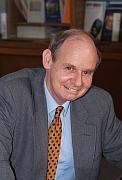 R. J. W. Evans
R. J. W. Evans
The author wrote it for the other dozen specialists in the European history of this time and place. No concessions are made to the educated reader (that’s me) despite the Thames and Hudson imprint. It reads like a very good, but dead boring, PhD dissertation. However in a PhD examiners would expect all the quotations from Latin, German, Czech, Slovenian, Italian, French, and Occitan to be translated to show that the author understood them. Here such sources are paraded in the original. Likewise in a PhD examiners would expect all the names mentioned to be explained. In these pages there is much name-dropping, and little explanation.
‘Honeymoon to Nowhere’ (1965) by Akimitsu Takayi
A Japanese krimi set in Tokyo. It offers a window on the manners and mōres of Japan in the 1960s. The obedience to parents of marriage age women and also men is part of the plot as is corporate loyalty. There is some by-play between the investigating police office and the prosecutors that reveals their differing agendas.
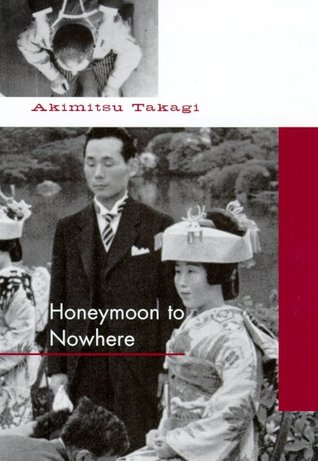
A few of the stereotypes are punctured, because there is corporate disloyalty, resistance to parental wishes, tax avoidance and these features must have made the book unorthodox at the time.
The description on Amazon made me think it was a police procedural, but the first 40% (I read it as an e-book so I noticed the percentage) is about the girl, her betrothal, and marriage and then her husband is murdered the night of their wedding. Before we get to the murder we learn much of her life, previous boyfriends, the effort of her parents to steer her to a suitable match, the one boyfriend who will not let go, and the courtship of her husband. Oh hum.
Even with the dead body, there is far too little action for it to be procedural. Mostly the police officer and prosecutor sit around speculating on what might have happened without a shred of evidence to guide their thinking. When evidence kills one line of speculation, rather than pursue more evidence they retire to speculate more. Oh hum. Wordy.
The plot is well developed and wraps everything up, but I am not sure how many readers will persist. I did, and that is a tribute to the ingenuity of the plot, not to the action or to the vividness of the characters, whom I had trouble keeping straight.
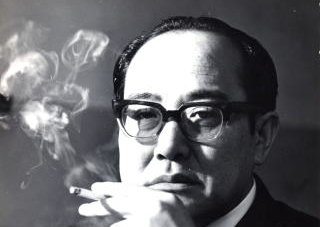 Akimitsu Takagi
Akimitsu Takagi
The author has several other krimis in print.
‘Bellringer’ ( 2012 ) by J. Robert Janes
An intriguing set up for our very weary duo.
Before the war, the luxury spa hotels of Vittel hosted the wealthiest members of French and international society. Now, in the winter of 1943, two of these hotels hold British and American women, the former since 1939 and the later since December 1941. The prisoners had lived quietly, surviving on Red Cross aid packages, but now they are beginning to die.
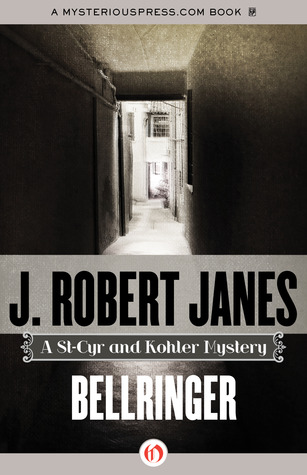
One American woman died in a fall down an elevator shaft, and it was assumed to be an accident, then an unknown assailant stabbed another to death with a pitchfork in the stables. With the second death the commandant calls for help, and inspectors Jean-Louis St-Cyr of the Sûreté and Hermann Kohler of the Gestapo arrive. In the pockets of the second victim they find Cracker Jacks and Hershey bars — presumed to be bribes for the guards. St-Cyr and Kohler have to unravel a conspiracy that is at the heart of this odd arrangement.
Above is an edited version of the blurb on the Amazon web site which seemed to me to be both inaccurate and overblown. No Germans stormed into Vichy. The two groups of women are in separate hotels and that is part of the plot, and they have been incarcerated for different periods of time. Whatever the past of the hotels, there is no luxury to be found there. Nor does it make sense to call a hotel a camp. The garbled blurb is very like Janes’s prose. I have read many of the titles in this series but the prose is leaden.
Janes does a good job of distinguishing among the women. There are many different stories among them, and in fact, some of the inmates are French married to Brits or Yanks but with the wrong passports when their papers were inspected. Their individual hopes, aspirations, methods of dealing with the privations and boredom are well brought out, like clutching at occult straws. Confined and controlled for years, there are endless frictions, grievances, and complaints which, powerless to affect the casual agents, the Germans, they take out on each other. There are tensions between the two nationalities, and even more within each.
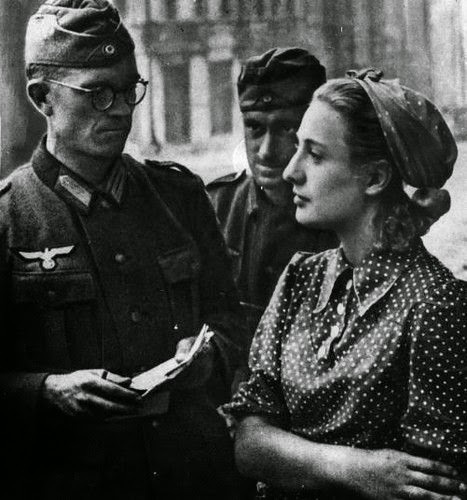 ‘These papers are not in order!’
‘These papers are not in order!’
By the same token there are tensions among the German guards, who would rather be there than in Russia. The commandant who called in the investigators has been undermined and replaced by a subordinate who wants no investigation.
Most of the investigation falls on the American hotel, many of the occupants of which are students who were doing courses in France when the curtain fell.
The grey prose, the cryptic descriptions, the gnomic interpretations, the ambiguity of voices, they all combine to obscure the denouement. But then I read these for the atmosphere, not the arrival. Once again the pair prevail despite all the impediments.
‘Atmosphere’ I said. For example, the privations of the Occupation. Everyone is hungry, and have lived for so long on a poor diet that their senses are diminished, they have no stamina, and cannot concentrate. Nor are the German jailers much better off.
‘That’ll be the day.’
‘The Searchers’ (1956)
After much anticipation I took myself off the Dendy on the Harbour to see ‘The Searchers’ on the wide screen. Wow! I expected that at two+ hours it would drag now and then, but no. The lights went down — and mercifully we were spared Val Morgan’s assault on intelligence — and the titles started. There in the darkened theatre the mythic events and characters came to life. Roger Ebert said a movie is a machine for empathy. Click went the machine.
‘The Iliad’ with the doomed Achilles, ‘The Odyssey’ with the bedevilled Odysseus, and ‘The Searchers’ with the haunted Ethan Edwards are each epics of endurance but also of self-realization. Each is a man of war whose role in peacetime is uncertain, precarious, and unhappy. But each is needed in times of war.
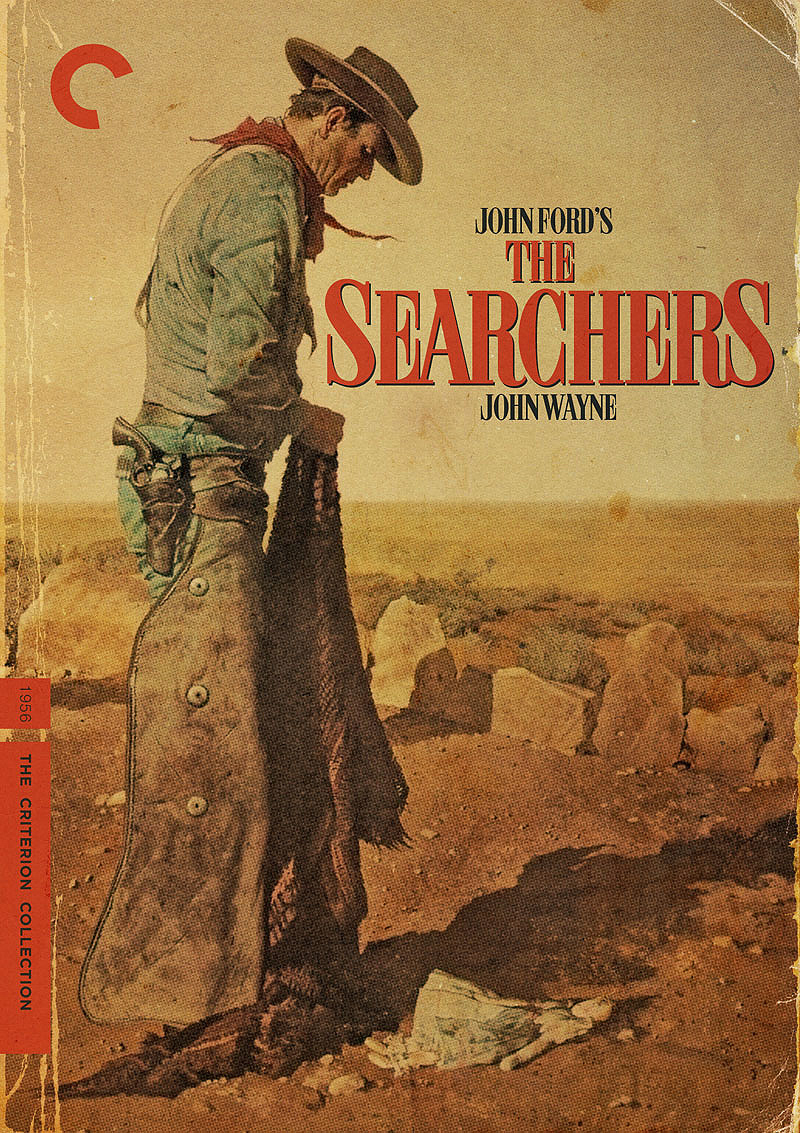
What can be said about ‘The Searchers’ that needs saying, or has not already been said many times? Film schools have dissected its technical aspects, deep focus, Vista Vision, the framing shots, the comic interludes, filming the horseback chases, the terse screenplay, and more that I do not fathom. I am even more sure that Cultural Studies aliens have parsed it into an empty husk in more than one PhD dissertation, burying it under polysyllabic barbarianisms to prove to each other how smart they are. The pygmies must have their days.
Yet it remains on any informed list of great films and at the top of its genre, the Western. ‘Shane’ (1953) is so elegiac it is hard to watch without choking up, and there is no greater moral lesson than ‘High Noon’ (1952) or ‘The Unforgiven‘ (1992), and a personal favourite is the laconic ‘Comes a Horseman’ (1978) or the profound ‘The Misfits’ (1962), not to mention Ford’s own cavalry trilogy. All are excellent and so are many more, ‘Lonesome Dove’ (1989). ‘Ride the High Country’ (1962) but they are second to ‘The Searchers.’ To the reader who has never seen ‘The Searchers,’ what can be said?
First, the film has pace. At nearly two hours, it is long, but the pace keeps an audience engaged, as I rediscovered.
Second, it offers the remarkable landscape of Monument Valley and the Grand Tetons. For the geographically deprived, Monument Valley looks just like its name, a flat, red plain with soaring rock monoliths, while the Grand Tetons are mountains that rise from a high grassy plain without foothills of any kind. (We spent a few days in both some years ago, and they still look just like that.)
 I stood on this very ledge once upon a time.
I stood on this very ledge once upon a time.
Third, there is the cast of characters from John Ford’s stable, each supporting actor getting face time, and some memorable dialogue. Today supporting actors might as well be CGI.
The natural and social context is rich then in place and people.
Four, the Indians are allowed an integrity not seen again in Westerns until Ford’s ‘Cheyenne Autumn’ (1964). The whites fear and hate the Indians for good reason in this world, and vice versa. This is a clash of equals who are enemies.
Fifth, there is the moral tale of redemption as Ethan Edwards, whose hate knows no bounds, whose disappointments are innumerable, whose future is bleak, whose past was bitter hardship and defeat, finds the little remaining humanity he has, much to his own surprise. Some of the close-ups of John Wayne’s expression of hate are works of art.
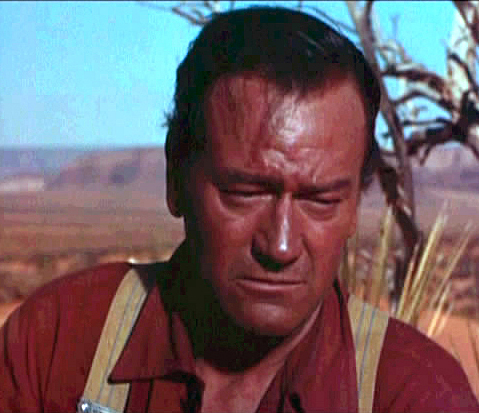
The most powerful one I could not find on the web. That is when he looks back at the crazed women captives at Fort Robinson. It delivers a silent jolt of hatred that foreshadows all that is to come.
This Wayne character is an unpleasant and twisted man, not the anodyne hero he often played. Added to that is the flat voice only he could ever do.
Ethan has one moment of pathos, yet he has no future, ergo the last scene when from the doorway he turns away. This Achilles has no place in an ordered society. He knows that even if no one else does. It is a moment of self-consciousness worth seeing, made the more powerful without either a close-up or a comment. Understatement, thy name is no longer Hollywood.
The story is simple, as epics are. A Comanche raiding party carries away a young girl and the Texicans pursue it. The going is hard, and in time most of the pursuers give up, but not Ethan for whom the pursuit becomes an addiction that gives his miserable life meaning. This man who has lost so much, will not accept another loss. That obsession transmutes into blaming the victim, and when the opportunity comes to rescue the girl, well, there is a moment of profound hesitation and doubt, which is beautifully realised by the camera, the dialogue, the director, the actors, as if for a moment they were all elevated to a higher plane to produce a masterpiece. In this scene, as elsewhere, Director Ford cut lines of dialogue and relied on the actors and camera to tell the tale. All this is silently observed by the vastness of nature broken by a single line of dialogue: ‘Let’s go home.’
The pygmies find much to fault. The cast is replete with the stock characters of westerns. The subplot involving a romance is not well integrated. As there are stock characters, so there are stock events and incidents, a dance, a fist fight, etc. One part of the film is Ethan’s gruelling quest played out against the social context back home. In joining the two, Ford perhaps made the former acceptable to audiences by reassuring them with the latter. Maybe the combination also satisfied him, too. It certainly satisfied Homer because he juxtaposed Ithaca with the war at Troy.
Those who are easily satisfied can hang the label ‘racist’ on Ethan and leave it at that. Ethan does hate, and these Indians have done much to earn his enmity, and vice versa, but Indians are also shown as majestic, insightful, good humoured, and with a nearly divine endurance. The only reprehensible character in the film is the store-keeper Jerem Futterman.
It is a movie that has a coherent screen play complemented with some very astute camera work to punctuate the story, and then there are Ford’s veteran actors who know what to do and how to do it. Though it does lack one of his usual features, namely a chorus to note silently the futility of it all. The assembly of the family on the porch at the initial homecoming is a near example, as are the Comanche women lined up when the Mexican trading party enters. But neither shot is held, nor is there any obvious emotion.
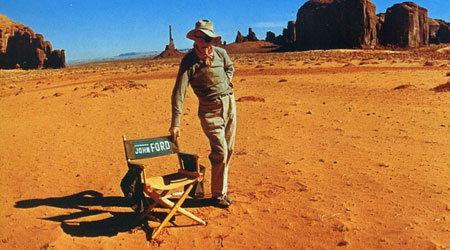 John Ford on location in Momument Valley
John Ford on location in Momument Valley
That dean of movie reviewers Roger Ebert used words like magnificence, unforgettable, influential to describe it. Though it is clear to this reader Ebert was gun-shy of praising the film too much for fear of eliciting rants from the pygmies. On You Tube there is a comment on the film from Martin Scorsesse who styles Ethan Edwards a ‘poet of hatred.’
Perhaps one day, Hollywood will butcher this one, ah, remake it. How would that go? Scar will be an innocent victim, and will be played by … Angelina Jolie. Like it so far? The Rupert Murdoch’s cavalry will kidnap Scar’s little brother played by Johnny Depp, using his Tonto make-up which hides the white spots on his face. Angelina can lead a band of Amazons to abstract Johnny from the clutches of the villainous general played by … Ron Howard! Is this gold, or what!
‘Dot Dot Dot’
A play at the Old 505 Theatre on Eliza Street at #5
O’Connell Town has its own live theatre between King Street and the Camperdown Park. I noticed it on a circuitous path from the gym to our new digs, and found it on the web. I read about ‘Dot Dot Dot’ and we decided to go.

The play is set on the cusp of Federation in late 1900 in Sydney. A serial killer is at work, called Noah because each murder is a pair, two school girls, two merchants, two football players, etc. Two-by-two, Like the Ark before the flood. There is some Victorian spiritualism to confuse matters, a manipulative media mogul (guess who), a spineless political establishment, and much hysteria. The analogies to current events are transparent, but the play is not preachy.
The title ‘Dot Dot Dot’ I took to refer to connecting the dots to figure out what was going on and who was doing it. There is a twist in the tale that I will not spoil.
The staging was spare, toward the Kabuki end of the spectrum of stage craft, and, fittingly, there was some singing, though it is not a musical. Four players suffice. The young man has two roles to fill, as the naif police office and the scion. The older man likewise doubles up as the sage copper and the media mogul. The two women stay in their respective parts as sideshow mystic and woman of the night. The relationship among are tangled, and gradually get untangled through the first long act and the second short act. The direction is crisp, and the players inject conviction and energy in their performances.
 Lucy Miller and Matt Bell-King
Lucy Miller and Matt Bell-King
Niggles, we had a few. Some of the longer speeches were delivered at light speed, and I am sure we missed some relevant things. The shoes worn by the young police officer/scion are currently fashionable with the clown toes, but were not au courant at the fin de siècle in 1900. At one point the mogul says to his son that he will send him to Paris where he ‘can be among his own kind.’ We each independently thought that a reference to homosexuality, but it is not developed and the son seems to have had a sexual liaison with the female mystic. Given the Old 505 Theatre’s association with the Gay and Lesbian Mardi Gras, touted on its web page, the homosexual references is palpable, but irrelevant it seemed. That mystery did not detract from the fun of the show and gave us something to chew on while walking home across the park, where the nocturnal hoons were yet to gather, the pubs had not yet closed and flushed them all out.
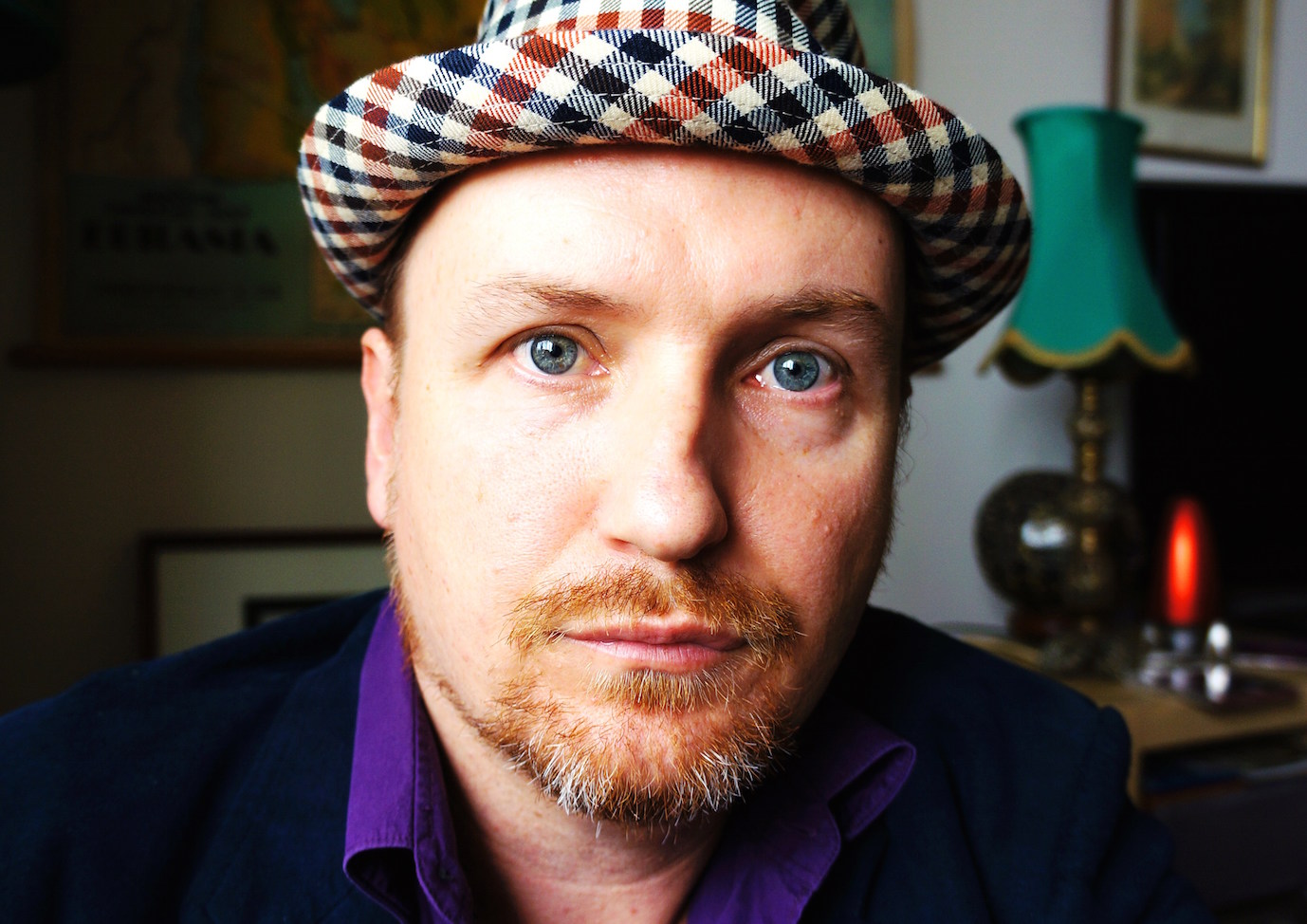 Drew Fairley, the writer
Drew Fairley, the writer
The venue is intimate, seating seventy at most; we sat in the back row but were not more than ten meters from the performance area. The front row is on the floor where the performance occurs at one point in a dramatic scene toward the denouement one of the actors, in full oratorical flight, brushed the foot of a spectator in the front row who gave a startled shout that added to the tension of the moment.
